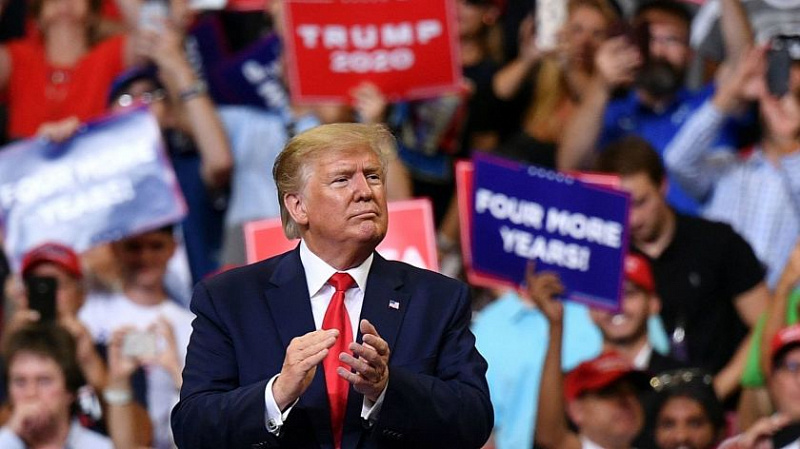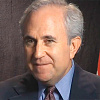A truly decisive election: A campaign unlike any other
In
Log in if you are already registered
August 7 — In less than three months, Americans will make a choice which will determine whether the people of the United States have the moral fitness to save the republic. All elections can be said to be decisive moments in history, defining the period ahead. This time, it is not only more true than ever, but the reality is that this is one of those rare moments when what is done by an aroused minority of activists, between now and election day, to shape the outcome of the vote, is what is crucial, as there is urgent "unfinished business" from the first three-and-a-half years of the Trump presidency to be accomplished.

Photo: Mandel Ngan / AFP/Getty Images
The election of Donald Trump in November 2016 delivered a profound shock to an establishment which assumed that Hillary Clinton's election would assure continuity in strategic and economic/financial policy. They were wrong. The decades of post-industrial wreckage imposed on the nation, transforming it from an industrial powerhouse to a nation dependent on cheap goods imported from poor nations, had taken its toll. The destructive effect of non-stop wars and military adventures, which destroyed thousands of the nation's young people, and wasted trillions of dollars in actions which made the country less secure, triggered a restless anger, which political leaders and pundits somehow overlooked, and the pollsters missed.
Trump's insurgent campaign decimated the old guard of the Republican Party on the way to his nomination, then repeated this in the general election. While Hillary Clinton arrogantly assumed she would be the inevitable victor, voters in states between the two coasts rejected her intent to continue the devolution of the Obama presidency. Trump's campaign rallied support by calling for an end to the wars of the George W. Bush and Obama years; overturning the trade deals worked out by corporate cartels, through which they profited obscenely at the expense of America's productive work force, which was being driven into poverty; and providing an optimism that America's best days were ahead, in contrast to the pessimism imposed by the anti-growth, fake science of "man-made climate change", and Green ideology.
Most significant among the challenges he posed was the idea that a strong national economy and defense capability opened the door to peaceful cooperation with those nations designated by previous regimes as dangerous adversaries. In particular, he ridiculed the mainstream geopolitical dogma which held that Russia, under President Putin, was again an enemy, and should be confronted, for example, in Syria, where Clinton was willing to risk a war by imposing a "no-fly zone" to oppose Russian intervention to defend the government there from CIA-armed and trained terrorists, disguised as "moderate rebels." It was Trump's oft-stated desire to establish friendly, cooperative relations with Russia, which triggered the fraudulent narrative, fabricated by imperial forces in British intelligence and their allied War Hawks in both U.S. parties tied to the "Military Industrial Complex," to challenge his election, beginning in the middle of 2016.
The overdue demise of russiagate
A series of events sponsored by LaRouchePAC in the last week have thoroughly shredded the narrative of Russiagate, exposing it as a fabrication of deeply-entrenched operatives in the permanent bureaucracy, directed by leaders of the UK's MI6 and City of London financial interests, in coordination with leading figures of the intelligence community under Obama. Presentations by long-time Trump ally Roger Stone and the former Technical Director of the National Security Agency Bill Binney provided conclusive evidence that there was no "Russian meddling" in the 2016 election, and that the fabric of lies woven by the investigation of special counsel Robert Mueller was intended to prevent the Trump administration from pursuing peaceful collaboration with Russia and China1. The continuing chanting of the mantra of the War Hawks of "Russia, Russia, Russia," followed by the equally fraudulent war drive against China, are expressions of the desperation of those savage forces to keep the era of "endless wars" alive. This has been typified by bipartisan Congressional opposition to Trump's efforts to remove U.S. forces from Syria and Afghanistan, and reach a peaceful resolution with North Korea.
In his comments, Stone — whose prison sentence from a corrupt conviction in a federal courtroom was commuted by Trump — reminded viewers that Trump's attacks on the strategic and economic policies of the entrenched establishment was what provoked the enmity reflected in the continuous campaign against him. Stone said that he foresaw this destructive behavior as early as the 1980s, with the attacks against Lyndon LaRouche. He emphasized that the key to Trump's re-election is to return to the theme of peaceful cooperation, centered on ending the "endless wars", and restoring the optimism of a pro-growth economic policy, oriented toward reviving U.S. industry through fair trade, and investment in infrastructure.
Binney, in addition to elaborating his forensic investigation, which decisively proved there was no Russian "hacking" of the Clinton and Democratic National Committee computers in 2016, presented a compelling case against the "weaponization" of intelligence gathering. It was this process, accelerated over his objections after the 9/11 attacks on the U.S., which allowed for the illegal "spying" on the Trump campaign, as well as the collection of data on every American, in the name of security. Binney described the present crisis as the most threatening to the constitutional republic since the Civil War.
Biden and the old regime
Trump's likely opponent, former Vice President Joe Biden, is campaigning to take the nation back to the "normal" times of the Obama presidency. Ignoring what Lyndon LaRouche referred to as the "global insurgency" against the "establishment", which played a major role in Trump's election, and continues to this day, Biden's team believes there is a yearning for the days of the Obama presidency. Do they truly believe Americans want to continue the endless wars? Go back to trade agreements which destroyed the goods-producing capacity of America's work force? Reject scientific and technological advance in energy production and space exploration, in favor of the false promises of a fascist Green New Deal?
Despite polls which show Biden consistently ahead of Trump, his candidacy has not created the sense of inevitability that characterized Clinton's team in 2016. His backers are counting on despair over the spread of the COVID-19 pandemic, the accelerated collapse of the economy associated with the lock-downs to fight it, and a "Trump fatigue" factor related to the constant smears and slanders against the President, to assure a victory. This latter element continues, with the deployment of violent extremists who are burning American cities while proclaiming that Trump is a racist, and the latest attacks against the Trump organization by the Manhattan District Attorney, who leaked that he is looking into "criminal" financial practices by Trump's real estate companies.
But there is no love for Biden among voters, as his handlers well know. Given his inability to formulate coherent policy ideas — as his appearances often demonstrate signs of extreme mental deterioration — he has spent most the campaign in his basement, emerging only for short, highly-scripted statements to selected media accomplices.
The unraveling of the lies and slanders of Russiagate, which have been repeated endlessly by Trump's opponents, has opened the possibility to return to the positive thrust of his 2016 campaign. The outcome in November will therefore be determined by the ability to mobilize voters around a program which can accomplish what Trump promised to do in that campaign, to reverse the disastrous plunge towards war and bankruptcy which is the legacy of Bush and Obama. To that end, LaRouchePAC is circulating a "battle plan", which defines a positive direction for the nation, in the tradition of the American System policies which Trump enunciated before the all-out war to either constrain him, or remove him from office2. The solution is centered on LaRouche's advocacy of an agreement among the great powers to break with the speculative casino economy which has strangled the world economy since August 15, 1971, when Nixon broke with the Bretton Woods system; and on LaRouche's Four Economic laws. Trump, at various times, has fought for elements of LaRouche's approach, only to be frustrated by anti-Trump Democrats and neoliberal austerity proponents among Republicans.
As Roger Stone suggested, this is the ultimate reason for Russiagate, the recognition by the corrupt and bankrupt establishment that the "prophetic" ideas of Lyndon LaRouche could be implemented by the "outsider", Donald Trump. It will be up to an awakened section of the electorate to take this battle plan and deploy with it, to rebuild the coalition that led to Trump's 2016 victory. Such a development will make this campaign unlike any in recent memory, where voters give up their complacency, and overcome the brainwashing of the media, to become a deciding factor in directing the future of the American constitutional republic.
Footnotes
1 — The most significant of these events an August 4, 2020 conference, https://larouchepac.com/20200730/roger-stone-and-william-binney-speak-out-keep-republic-defend-presidency, and an exclusive interview Stone gave to this author, https://larouchepac.com/20200803/exclusive-interview-roger-stone
Vice President of the Schiller Institute USA, National Spokesman for Lyndon LaRouche
Blog: Harley Schlanger's Blog
Rating: 0




